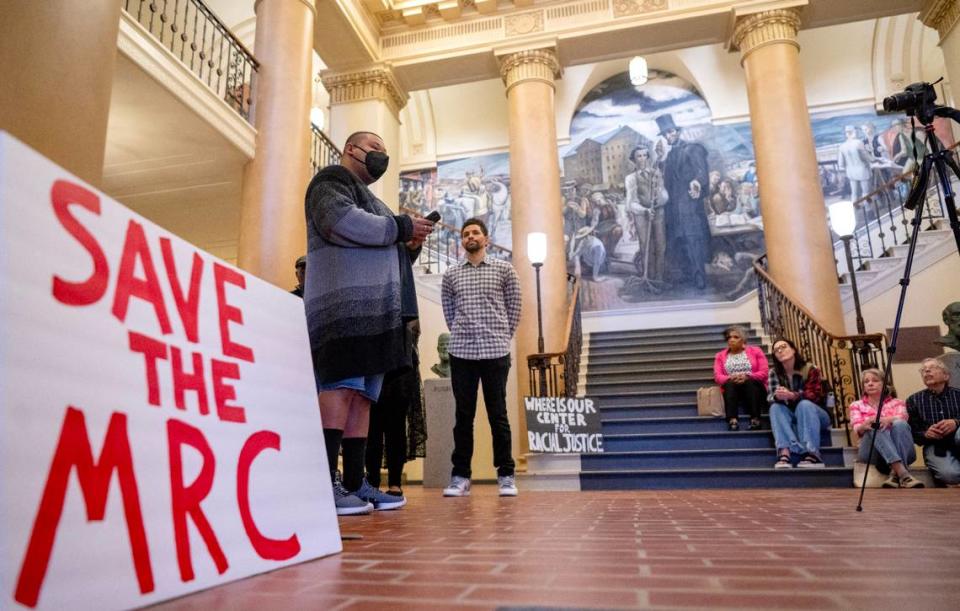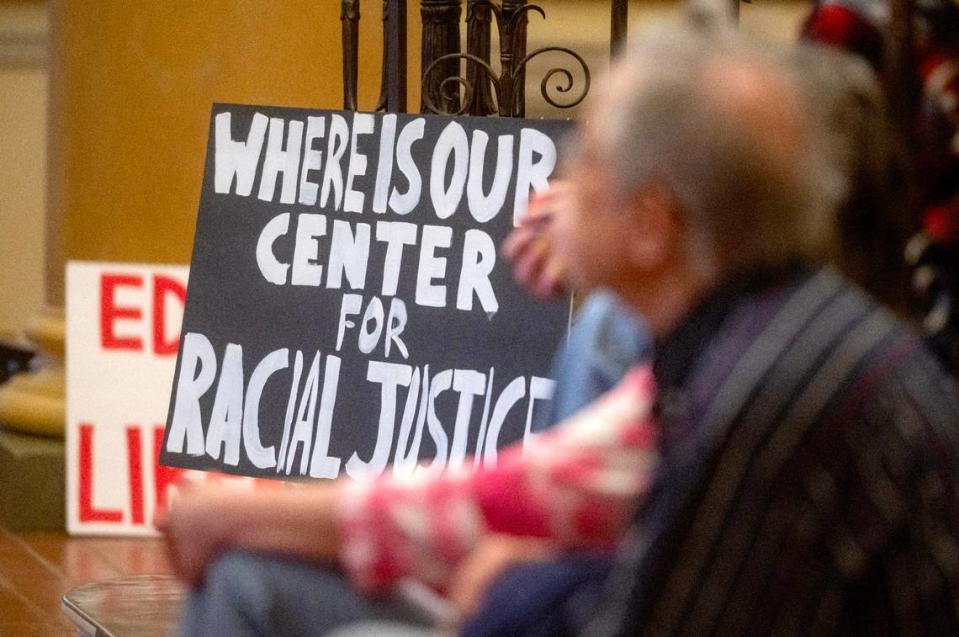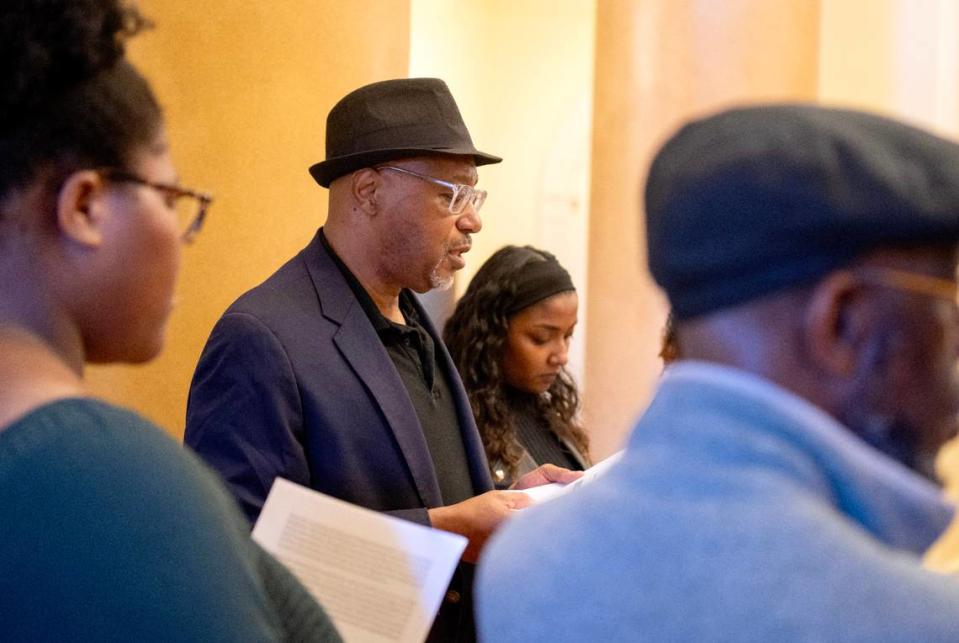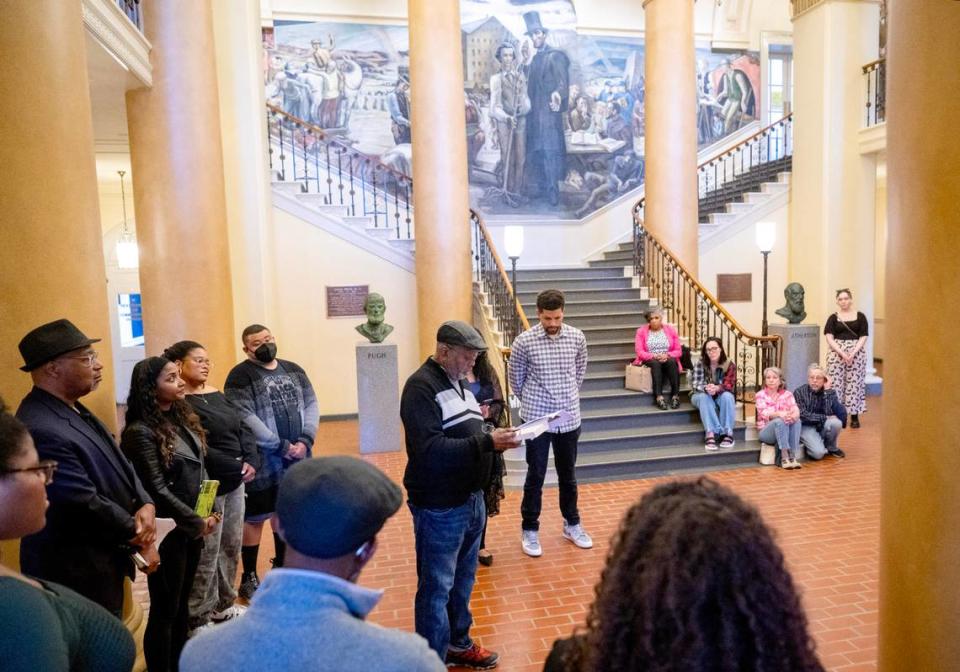‘Sick and tired.’ Black Penn State scholars call on university to act on racial injustice
- Oops!Something went wrong.Please try again later.
A group of Penn State professors and graduate students held a final read-in at Old Main on Tuesday to call on the administration to take action against racial injustice on campus. This time, they also delivered an open letter to the university president.
The group of participants, which has grown each time, has held three read-ins this semester where they each read works from civil rights activists, Black authors and more. Jennifer Black, an English professor, read an excerpt of Angela Davis’ “Freedom is a Constant Struggle,” as a reminder to those in attendance that they need to be persistent.
Mildred Boveda, a professor in the college of education, read Langston Hughes’ poem “Mother to Son,” which acknowledges racial injustice while arguing Black people should not give up. Dalia Batuuka, a grad student who also read, said she felt at peace knowing that so many people were in solidarity. And Pheolyn Allen, a Ph.D. student in English and African American studies, said he felt invigorated afterward.

“It’s one thing to bear witness to others doing the work and it’s a different thing to be welcomed into doing the work with them as well. Because this is very crucial work,” said Allen, adding it was “beautiful” to be able to speak truth to power in Old Main, where the university president’s office is.
After about 20 minutes of reading, three representatives went upstairs to the president’s office and delivered an open letter to President Neeli Bendapudi. Chris Dancy, a professor in the college of engineering, read an excerpt from the letter as copies were passed out to those watching.
The letter begins with, “We protest. We are sick. We are tired. Still, we protest” — a theme the group has had throughout the read-ins this semester, inspired by civil rights icon Fannie Lou Hamer.
“We are sick and tired of the lack of progress toward racial justice at Penn State under your leadership,” the letter continues. “We expected better. Your appointment and pronouncements had given cause for hope. As president of the University of Louisville, you issued a full-throated denunciation of institutional racism and systemic discrimination, laid out a ‘Cardinal Anti-Racism Agenda,’ and vowed to make Louisville ‘the premier anti-racist metropolitan research university in the country.’
“This statement is not a figment of our imagination. It is Neeli Bendapudi in her own words. On arrival at Penn State, however, you abruptly changed course, eating those words.”
The letter references the Center for Racial Justice, which was proposed by former Penn State President Eric Barron before Bendapudi canceled it in 2022. The letter questions Bendapudi’s reasoning, accusing her of contradicting herself by first focusing on cost savings and then making “another flipflop” by saying even more money would be spent on alternative racial justice programs.

“Anyhow, this has turned out to be a hollow promise,” the letter reads. It cites reporting from Spotlight PA that revealed two diversity initiatives Penn State said would receive better funding do not actually exist. And although Bendapudi pledged to invest money that would have gone to the Center for Racial Justice into other DEI efforts, some of those programs saw budget cuts as the university’s fiscal year 2023 budget began.
The letter accuses Bendapudi of avoiding words like “institutional racism,” “systemic discrimination,” and “antiracism” since coming to Penn State and calls into question a recent rebranding of university’s Office of Affirmative Action to the Office of Equal Opportunity.
The letter states: “More than mere semantics, these reversals may be read as a dog whistle signaling that, under your leadership, Penn State will not abide the ‘woke’ agenda of affirmative action and antiracist promotion that you once advocated. Seen in this light, the rebranding of the Office of Affirmative Action is a small part of a larger rollback across the nation. This is a political project aimed at reinstating, or ‘redeeming,’ a racially unjust social order and clawing back gains made by Black folk, real and imagined, a recurring theme in the American experience, whether in the post-Reconstruction, post-Civil Rights, or post-BLM eras.”
To do better, the letter suggests the administration review the two-volume More Rivers to Cross report — researched and written by Penn State faculty members about racial discrimination and institutional racism — or the Building on Our Foundation: Our DEIB Strengths, Gaps, and Recommendations for Meaningful Steps Forward report.

Grad student Deja Workman, who participated in the read-in, said she hopes Bendapudi takes the time to reflect on the letter, and that she invites others to read it and understand the issues. She’d like to see a thoughtful response with real action taken.
Darryl Thomas, a professor of African American and Diaspora Studies, and Dancy agreed.
“Some response would be nice and within that response, not only just an acknowledgment, but also the things we need, the resources that we’ve been calling for and the change within the university that we’ve been pushing for,” Dancy said.
The letter addressed to Bendapudi ended by calling for action.
“Until then,” the letter says, referring to meaningful change, “we will protest. We are sick and tired of the culture of elimination, erasure, and evasion that has characterized your presidency on matters of racial and social justice. We demand change — tangible change, change we can see.”


